Ikigai: The Japanese Concept Of Finding Purpose In Life
And How This Age-Old Ideology Can Help You Find Happiness
As we continue into mid-January trying to keep up with those well-intentioned but lofty New Year’s resolutions, there’s no better time than now to refocus our energies, and really plan out our hopes and goals for the future.
Though the “new year, new me” mantra is inspiring, the truth is if all that’s really inspiring us to do better is a different number on the calendar, maybe there’s a better way to fully embrace everything life has in store for us.
Enter ikigai, the age-old Japanese ideology that’s long been associated with the nation’s long life expectancy. A combination of the Japanese words “iki” (生き), which translates to “life,” and “gai” (甲斐), which is used to describe value or worth, ikigai is all about finding joy in life through purpose.
In other words, your ikigai is what gets you up every morning and keeps you going.
So what exactly is ikigai?
The origin of the word ikigai goes back to the Heian period (794 to 1185). Clinical psychologist and avid expert of the ikigai evolution, Akihiro Hasegawa released a research paper in 2001 where he wrote that the word “gai” comes from the word “kai” which translates to “shell” in Japanese.
During the Heian period, shells were extremely valuable, so the association of value is still inherently seen in this word. It can also be seen in similar Japanese words like hatarakigai, (働きがい) which means the value of work, or yarigai ~ga aru (やり甲斐がある), meaning “it’s worth doing it.”
Ikigai is what gets you up every morning and keeps you going.
Gai is the key to finding your purpose, or value in life. The best way to really encapsulate the overarching ideology of ikigai is by looking at the ikigai Venn diagram which displays the overlapping four main qualities: what you are good at, what the world needs, what you can be paid for, and of course, what you love.
Boiling it down to its most basic theory, it’s within the crossover of these points where ikigai stands.
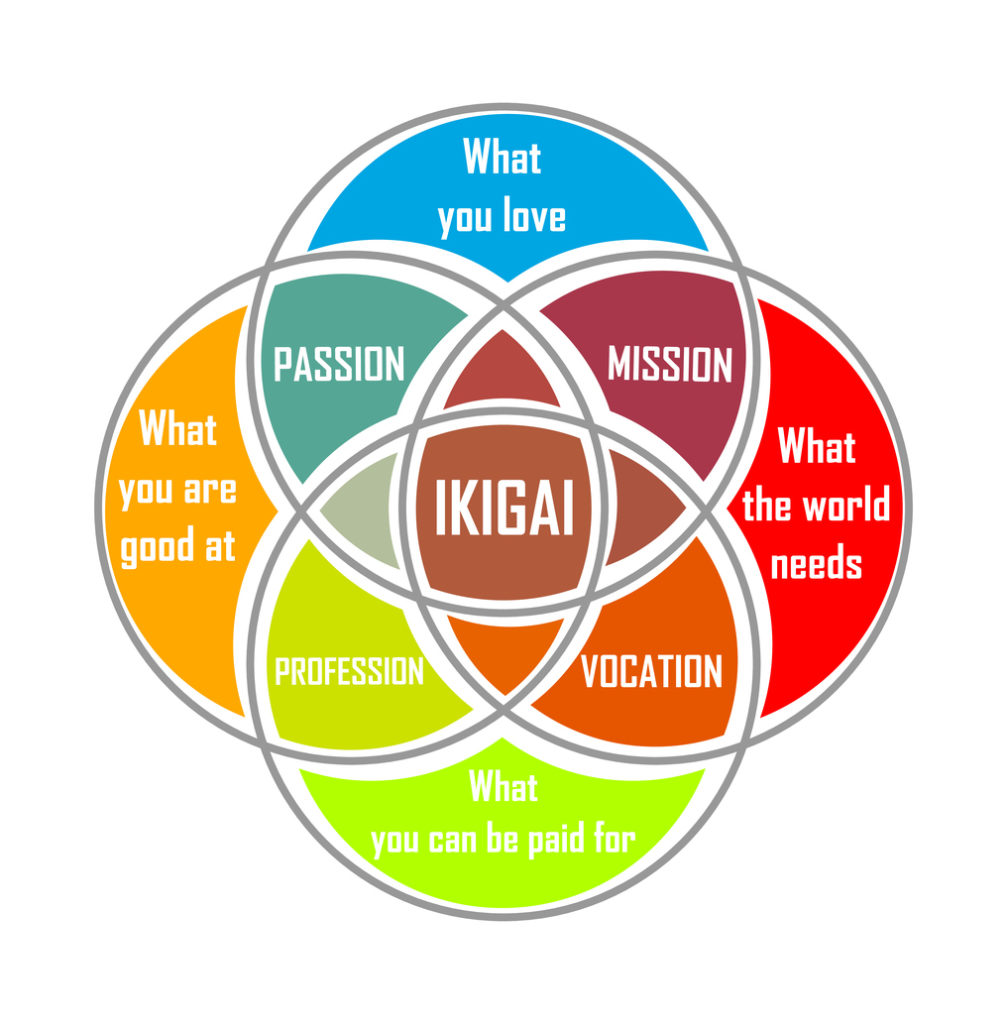
Why is ikigai important?
Many sociologists, scientists, and journalists have researched and hypothesized the usefulness and truth behind this particular phenomenon, and they’ve come to a number of very interesting conclusions. One particular theory is that ikigai can make you live longer and with more direction.
In September 2017, the popular Japanese TV program Takeshi no katei no igaku partnered with a group of scientists to conduct research in the small town of Kyotango in Kyoto, a place which prides itself in having a population that has three times more residents over the age of 100 compared to the average of the rest of the country.
The program wanted to know what commonalities these elderly happy people had in their daily lives and so followed seven people in their late 90s and early 100s around from morning ‘till dawn, doing blood tests and other health check-ups.
What they found interesting was that all seven people had exceptionally high figures of DHEA, a steroid hormone secreted by the adrenal glands that many believe may be the miracle “longevity hormone.”
Interestingly enough, as the program followed those men and women around, they found one single thing they all had in common: a hobby they practiced every day that they were really into. One woman in her late 90s was seen spending a few hours everyday carving Japanese traditional masks, another man painted, another went fishing daily.
While the correlation between having a hobby you love and the increase of DHEA is yet to be proven scientifically, the program suggested that having this one thing that keeps you interested, focused, and gives you a sense of satisfaction in life may boost your youth DHEA hormone, thus leading to a longer and happier life.
Where is ikigai practiced?
Okinawa, the southern island off of mainland Japan, is home to one of the highest ratios of centenarians to population. Okinawa is also a hotbed of ikigai ideology. Here the mild weather, healthy diet, and low level of stress are also factors, but it’s the island’s active population of non-retiring, purpose-driven residents that links them to other long-living communities in Sardinia, Italy and Icaria, Greece.
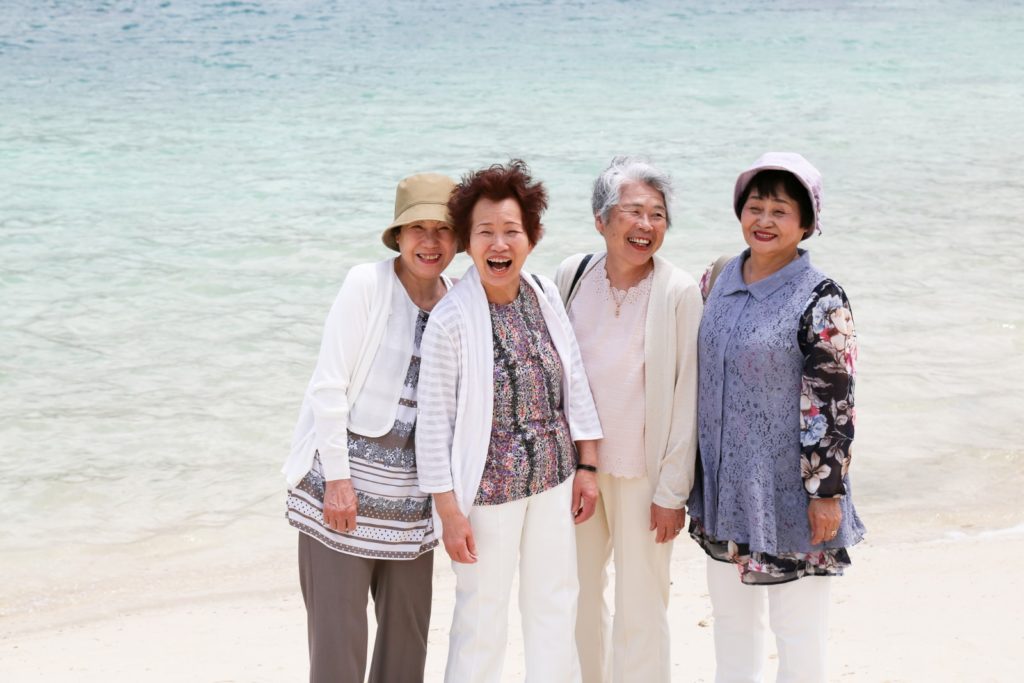
Okinawa is home to some of the longest-living people in the world.
In 2010, writer Dan Buettner released a book titled Blue Zones: Lessons on Living Longer from the People Who’ve Lived the Longest, in which he studied areas in the world, home to the longest-living residents (including Okinawa). What he discovered was that though they may have a different word for it, ikigai, or having a “purpose in life” was a strong uniting link.
[I]f you can find pleasure and satisfaction in what you do and you’re good at it, congratulations you have found your ikigai.
Hector Garcia, a writer who has released a number of books on this theory, including Ikigai: The Secret to a Long and Happy Life released in English last year, believes, however, that this ikigai shouldn’t just be linked to the elderly folks. In fact, it’s currently more popular than ever with younger people both in and outside of Japan.
“We found [releasing the book that] one of the keys of its success is the timing of the word ‘ikigai.’” He argues that it’s gaining more mainstream traction now, just when people need it, “especially in younger generations looking for more meaning in their lives.”
What’s your ikigai?
In his book, Garcia says that studying the ikigai ideology has changed the way he shapes his day.
“I have improved my morning routine to start my days doing what is most important to me before getting busy with others.” In other words, he prioritizes the duties that give him purpose. “This means that I have a cup of green tea, do 15 minutes of easy yoga poses and then write for one hour. Before leaving home, I have dedicated time to my health and one of the activities that give ikigai to my life: which is writing books.”
Though it may sound career-focused, ikigai is not always about financial endeavors. Having a hobby that you can dedicate your time to, raising a family, or being able to work and make steps towards diving deep into that passion project you’ve always fantasized about, are all ikigai.
Finding your ikigai
If you’re feeling lost or unsure about what your ikigai is, there are a number of ways to refocus your mind and purpose.
“If you find yourself blocked because change is difficult, try adding some new thing to your life: a new hobby, new circle of friends, or a new job on the side,” Garcia suggests.
Tokyo-based neuroscientist, writer, and broadcaster Ken Mogi argues in his 2017 book, The Little Book of Ikigai: The Essential Japanese Way to Finding Your Purpose in Life, that it doesn’t matter whether “you are a cleaner of the famous Shinkansen bullet train, the mother of a newborn child or a Michelin-starred sushi chef’ – if you can find pleasure and satisfaction in what you do and you’re good at it, congratulations you have found your ikigai.”
Having a hobby, raising a family, or being able to work and make steps towards diving deep into that passion project you’ve always fantasized about, are all ikigai.
If you feel like you’re struggling, Garcia makes the suggestion that you “gain awareness of the current status of your life.”
Start by putting together a note of the top 10 things you have spent your time on this week. After writing them down, ask yourself if those things are adding purpose to your life. You can subdivide by asking yourself four questions:
- Is it something that I love doing?
- Is it something the world needs?
- Is it something I’m good at?
- Is it something I can get paid for? If it’s not something you can get paid for, is what you can get paid for a good trade-off for really financially supporting your ikigai?
If this all feels a little too cemented and you have trouble committing, don’t sweat it, research has uncovered that just like music taste, fashion and, opinions, a person’s ikigai can change and morph with age, so chances are they need a semi-regular checkup. The folks in Takeshi no katei no igaku had all picked on their new hobbies after retirement—and if that’s not showing that it’s never too late to start enjoying life, we don’t know what is.
Maybe in 2020, it’s time to refocus your new year’s resolutions and embrace the larger picture: finding your ikigai.












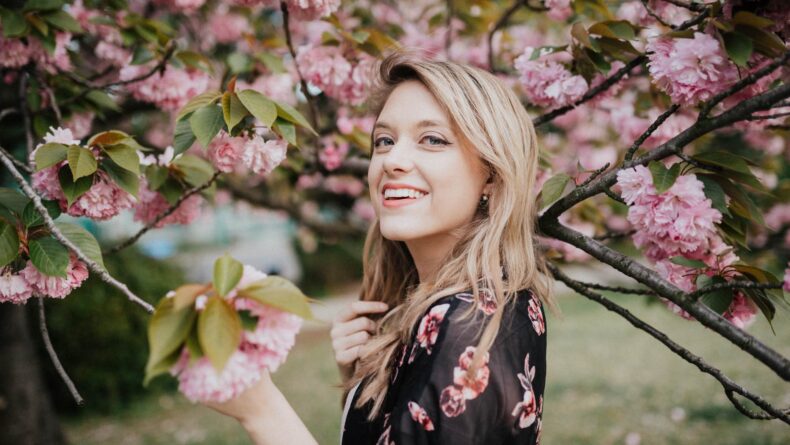
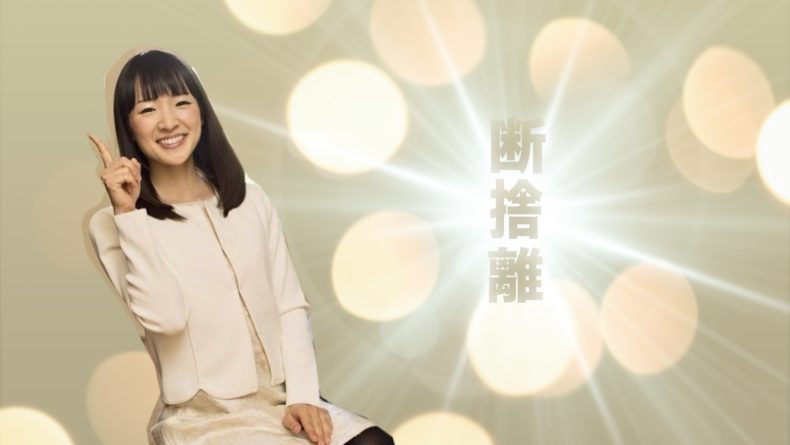
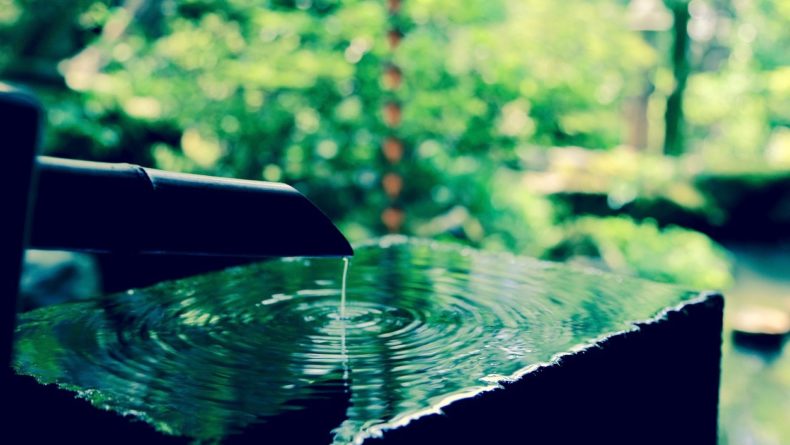
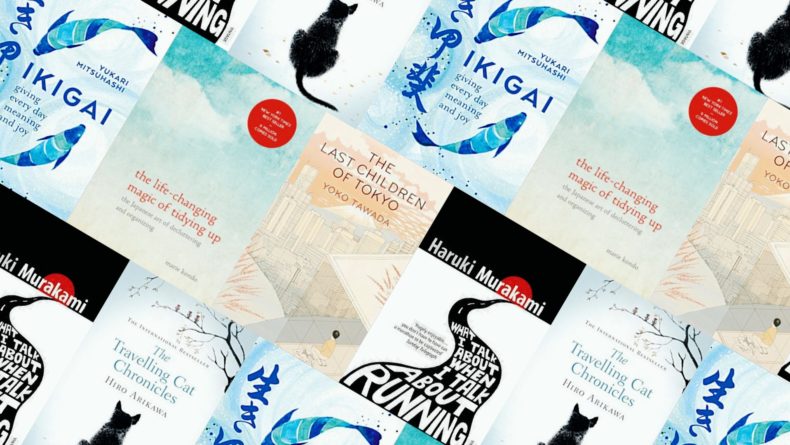
Very helpful in decision making and prioritization
Great focus and descriptions for a very fruitful life.